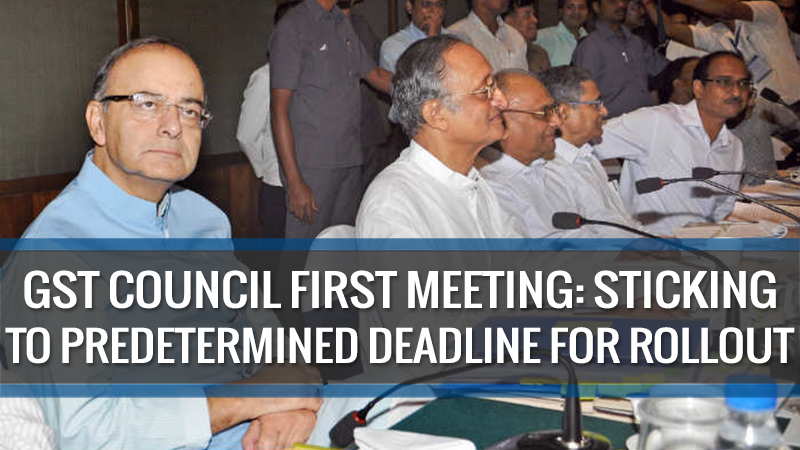
The demand was from various states including Uttar Pradesh and Tamil Nadu which provided a notion of the fact that a smaller state on equal footing with a large manufacturing one requesting one-state-one-vote principle.
The issue of the exemption was also discussed but struck in between, as some states demanded traders with a turnover of Rs 10 lakh or less be exempted, a large number, including Delhi, were in favor of the limit being fixed at Rs 25 lakh in a year.
The two-day meet was attended by 29 states and 2 union territories and was commanded by Union Finance Minister Arun Jaitley will continue until Friday. The main agenda seemed to find a way to compensate the revenue loss of the states by the implementation of GST.
While getting indulged with reporters, Arun Jaitley revised some of the points again, “The target also involves the passage of CGST and IGST law at the central Parliament and then by the state legislatures the state GST law in the winter session itself.”
“Today, starting from September 22, we roughly have two months time until November 22 to resolve all outstanding issues and therefore a draft timetable was given which also have been adopted,” Jaitley said. The GST Council meeting, which will continue tomorrow, will discuss on the compensation formula and with regard to the provision for cross empowerment, he said.
“With regard to composition we have finalized our proposal which has been unanimously accepted by the members.
With regard to the threshold for exemptions, there are two sets of suggestions which have come. We have converged to those two different views and both on officers and ministers track we will continue the meeting tomorrow and thereafter so that we are able to converge to one particular figure as far as the exemptions are concerned,”
Every state has to redefine the Constitution Amendment Bill on GST to get the position for eligibility in voting in the council of GST with their respective states. And about the trader’s taxation issue, Revenue Secretary Hasmukh Adhia said, “A consensus on compounding or composition scheme arrived at the GST Council meeting on Thursday which decided that traders with gross turnover cut-off of Rs 50 lakh will pay 1-2 percent tax.”
The overall scheme has been anticipated for an ease way to determine tax liability and makes a point for registration by dealers A consensus on compounding or composition scheme arrived at the GST Council meeting on Thursday which decided that traders with gross turnover cut-off of Rs 50 lakh will pay 1-2 percent tax, as said by Adhia, “The scheme has been introduced in the Goods and Services Tax (GST) regime to reduce the administration cost associated with collection of tax from small traders.”
Which in turn, give the business a sigh of delivering tax at a defined base rate of 1-2 percent on the turnover of Rs. 50 Lakh, which is seen as lower than the actual GST rate. Arun Jaitley coming again the picture said, “The Council will meet for a number of days in quick succession so that other issues such as fixation of the rate etc, and whatever is outstanding from today’s meeting could be worked out.
“The meeting has been conducted and gone on in a true federal spirit and therefore what we have seen today is not any form of division in political lines, obviously people have the interest of their own governments and revenues and are entitled to that view point and out of that sense, a consensus will finally emerge. I am more optimistic today about the spirit in which the functioning of the Council has begun.”
Chief Economic Advisor Arvind Subramanian in his report recommended a standard GST rate of 17-19 per cent. While Delhi Deputy Chief Minister Manish Sisodia said, “We have discussed threshold. For Delhi, we have said that the threshold for exemption should be Rs. 25 lakh.”
The decision was also noted down that the state government officers can take part in the discussion but cannot be given the right to vote. And Kerala Finance Minister Thomas Isaac said, “the Council meeting also decided that Empowered Committee will continue if states want it to continue functioning.”
West Bengal Finance Minister Amit Mitra said exemption limit was “work in progress”.
“On the threshold limit, we have a constructive and warm discussion and there will be more thinking on that tomorrow,hoping for reaching finality on the issue at the meeting tomorrow,”he said.
Thomas Isaac mentioned some noteworthy points before attending the meeting was, “the agenda gives me an impression that the NDA (National Democratic Alliance) will take unilateral decisions given that the central government and the BJP-ruled states together form a majority in the council, there is no mention towards arriving a mutual agreement through broad discussions.”









